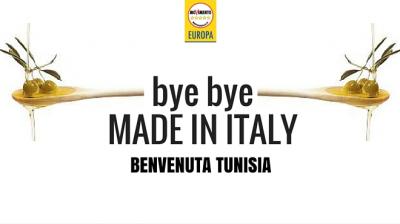Cheaper Tunisian olive oil to replace Italian on shelves?

ROME -- Italian opposition politicians are up in arms after Brussels gave the green light for Tunisian olive oil to be traded duty free in the EU with Prime Minister Matteo Renzi's government making little attempt to protect oil producers on the peninsula from the north African competition. The plenary in Strasbourg gave the final go ahead to emergency aid measures, which include the regulation allowing for the import of 35 thousand additional tons of olive oil, on Thursday, says a European Union spokesman.
The vote had been suspended from February 25, but technical amendments were adopted and on Thursday the text was passed in the European Parliament with 500 for, 107 against and 42 abstentions – a vote that came in record time. After the amendment of Movimento 5 Stelle (M5S), that blocked the process in February, Tunisia can only export olive oil from Tunisia, in order to reassure Italian consumers of the real origins of their oil.
“We were afraid of a vote in favour,” explains the M5S Deputy Filippo Gallinella, a member of the Agriculture Committee, “a decision that we have widely criticised and fought from the beginning, after Mogherini’s announcement. We denounce the fact that the Renzi Government did not attend the meetings where they could have vetoed Brussels’ decision. I refer to last Friday, on the occasion of the Technical Committee for Trade Policy of the European Council,” he adds, “with the Minister for Economic Development Federica Giudi pulling out yesterday morning [Wednesday] during the Corper debate, as well as the absence of the Foreign Minister. Not to mention the truly huge absence of the Agriculture Minister Maurizio Martina: in 2015 he skipped without justification as many as nine out of 13 European Councils.”
According to the M5S group in the European Parliament, the purchase of Tunisian oil only benefits large multinational distribution companies that mix the Tunisian oil with Italian stuff or sell it with ‘Extra-EU’ labels in the supermarkets. Also opposing the new move is the National Action Movement that, with the former environmental undersecretary Roberto Menia, had announced that there will protective bodies to safeguard extra-virgin olive oil with the ‘Made in Italy’ label in the major Italian ports, starting with those on the Adriatic coast such as Trieste and Bari.
“I remain firmly opposed to any permanent increase in the Tunisian oil contingent,” said Martina in a statement, “As of Minister for Agriculture, we have laid down clear conditions on the implementation and monthly quotas, and on these points I don’t intend to give in. If we have no guarantee we will continue to oppose the adoption of the regulation by the Committee.” He adds, “In the meantime, the Ministry of control bodies, from port authorities, to forest rangers, and fraud investigators will intensify port inspections of the incoming product. The Italian oil industry is among the most controlled of all, and in the last two years we have the level of response against potential fraud to a never before seen level.”
Just a few months ago, following the fake ‘extra-virgin olive oil’ scandal by an Italian-Spanish organisation, the Ministry of Agriculture retorted to M5S’ criticism that the information communicated by its Customs Agency had not been ignored but, indeed, used by its inspectors in different operations. “But today,” argued M5S deputies Gallinella and Cariello, “that’s again been disproved in respect to the data gathered by the police on NAS, which showed the quadrupling of extra virgin olive oil fraud. Where were and where are the controls boasted about by Martina?”
It was a thumbs down from Coldiretti as well who said that the gesture decided by the EU “risks not helping Tunisian farmers and favouring only the bottlers, also as it corresponds to an increase of only three percent, a figure that it far too low to have a real impact on the situation of rural poverty in the African country.” The situation prompted a demonstration for the defence of Made in Italy in Catania, where thousands of famers symbolically gathered, to defend “Italian crude oil.”
A similar response came from local Sicilians whose tomato market is being pushed down and many farms have been forced to close, due to high competition and low prices on the tomatoes grown in Tunisia and Morocco.
ch


